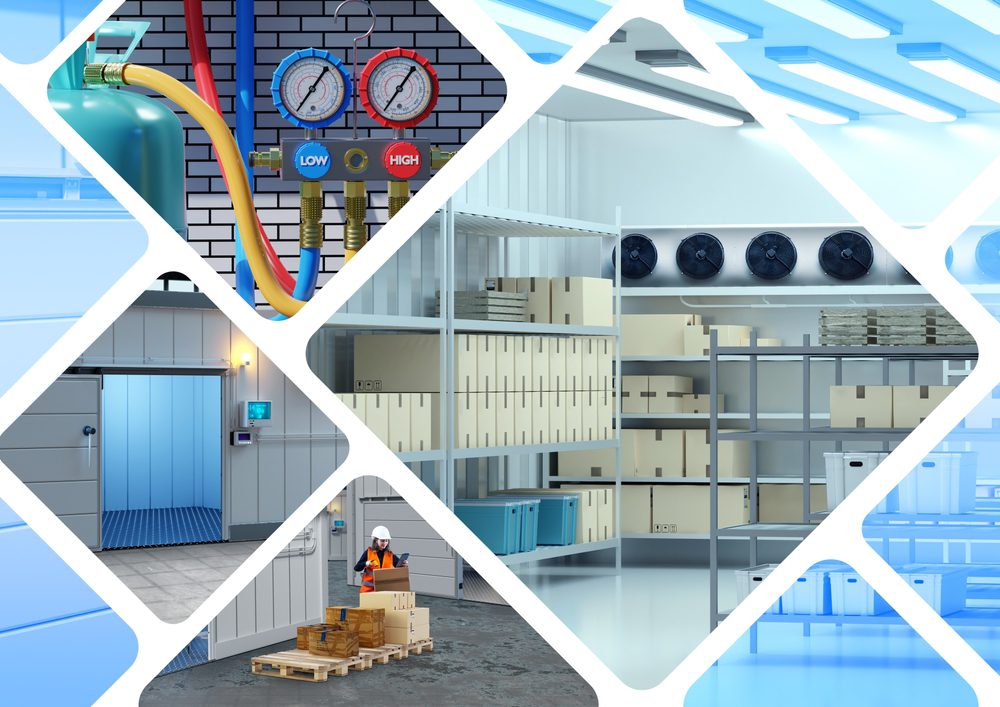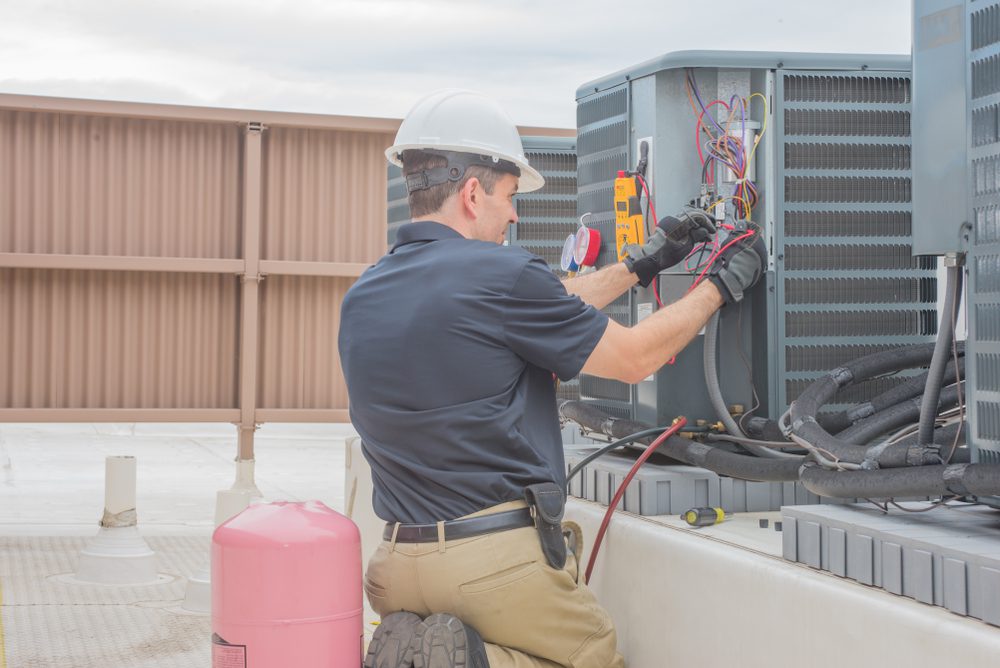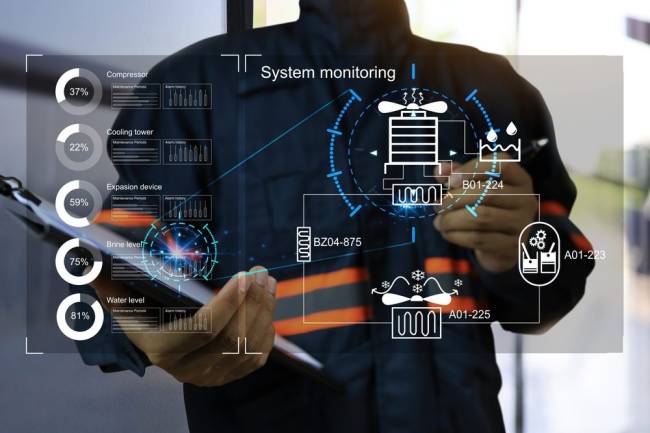Introduction
In the bustling world of commercial enterprises, where time is money, efficiency is paramount. From maintaining the comfort of customers and employees to controlling operating costs, your commercial HVAC (Heating, Ventilation, and Air Conditioning) system plays a pivotal role. In this blog, we will take a comprehensive look at the significance of commercial HVAC systems, emphasizing the importance of maintenance in maximizing efficiency.
I. Understanding Commercial HVAC Systems
Commercial HVAC systems are the unsung heroes of many businesses. These systems are complex, consisting of various components designed to maintain temperature, humidity, and air quality. Understanding these systems is the first step in appreciating the importance of their maintenance.
A. Explanation of Commercial HVAC Systems
Commercial HVAC systems are more intricate than their residential counterparts. They are tailored to handle larger spaces, complex layouts, and fluctuating demands. These systems are composed of multiple components, including air handlers, chillers, boilers, rooftop units, and ductwork. Understanding how these components work in tandem is essential for efficient operation.
B. Key Components and Their Functions
- Air Handlers: Air handlers distribute conditioned air throughout the building. They contain coils for heating and cooling and powerful fans to circulate air.
- Chillers and Boilers: These components regulate the temperature of the water used in the system. Chillers cool the water, while boilers heat it.
- Rooftop Units: Common in many commercial settings, rooftop units house various HVAC components and are efficient for space utilization.
- Ductwork: Ductwork distributes air, ensuring even temperatures and proper air circulation.
C. The Significance of HVAC Systems in Commercial Settings
Commercial HVAC systems are more than just temperature control. They impact various aspects of your business, including:
– Energy Consumption and Costs: HVAC systems can account for a significant portion of a business’s energy expenses. Energy-efficient systems and maintenance can lead to substantial cost savings.
– Comfort and Productivity of Employees: Maintaining a comfortable environment is not only essential for the well-being of employees but also for their productivity. A well-maintained HVAC system ensures a pleasant working atmosphere.
– Environmental Considerations: Commercial HVAC systems can have a considerable environmental impact. Efficient systems and sustainable practices can reduce your business’s carbon footprint and contribute to a greener future.
II. The Impact of Efficiency on Your Business

Efficiency in commercial HVAC systems is not a mere luxury; it’s a necessity. The implications of an inefficient system extend beyond comfort and extend to your business’s bottom line.
A. Energy Consumption and Costs
Commercial HVAC systems are voracious energy consumers. Inefficient systems can result in substantial energy bills, and in the long term, these costs can significantly eat into your profits. Regular maintenance is the key to keeping energy consumption in check.
B. Comfort and Productivity of Employees
The comfort of your employees is directly linked to their productivity. Uncomfortable working conditions can lead to reduced work efficiency, increased sick days, and decreased employee morale. A well-maintained HVAC system ensures a pleasant working environment, boosting overall productivity.
C. Environmental Considerations
In today’s world, businesses are increasingly scrutinized for their environmental impact. An inefficient HVAC system can be a significant contributor to a company’s carbon footprint. By implementing energy-efficient practices and technologies, your business can reduce its environmental impact and potentially benefit from government incentives.
III. Key Maintenance Tasks
To maximize efficiency and reap the benefits of a well-functioning HVAC system, it’s crucial to perform regular maintenance tasks.
A. Regular Inspections and Assessments
Preventive maintenance is the cornerstone of a well-functioning commercial HVAC system. Regular inspections and assessments help detect potential issues before they become major problems. A comprehensive inspection should cover:
- Inspection Checklist: Inspectors should follow a checklist that includes items like examining electrical connections, checking for refrigerant leaks, testing controls, and assessing the condition of belts and pulleys.
B. Cleaning and Filter Replacement
Dust and debris can accumulate in your system, reducing its efficiency. Regular cleaning and filter replacement ensure unobstructed airflow, maintaining optimal performance. Clean evaporators and condenser coils are particularly crucial for energy efficiency.
C. Lubrication and Component Checks
The moving parts of your HVAC system, like fan motors and bearings, require regular lubrication. Inspecting these components and ensuring they function correctly is vital for preventing wear and tear.
D. Refrigerant Level and Ductwork Inspection
Refrigerant is the lifeblood of your air conditioning system, and improper levels can lead to inefficiencies. Ductwork inspections are crucial for ensuring air distribution is efficient and balanced throughout the building.
E. Thermostat Calibration
The thermostat is the control center of your HVAC system. Calibration ensures accurate temperature control and prevents your system from running excessively.
IV. Scheduling Maintenance
Establishing a maintenance schedule is a strategic move. It keeps your system running smoothly and ensures that potential issues are addressed promptly.
A. The Importance of a Maintenance Schedule
A proactive maintenance schedule helps avoid costly breakdowns and emergency repairs. It provides peace of mind, knowing that your system is well-maintained.
B. Seasonal Considerations
Different seasons pose varying challenges to HVAC systems. Regular maintenance tailored to the season can help your system cope with temperature extremes and changes in humidity.
C. Choosing the Right Service Provider
Selecting a reliable service provider is crucial. Look for professionals with experience in commercial HVAC systems and consider signing a maintenance agreement for ongoing service.
V. DIY vs. Professional Maintenance
Routine maintenance is essential, but who should perform it? There are merits to both DIY and professional maintenance.
A. The Benefits of Professional Maintenance
Professional maintenance offers several advantages:
– Expertise: HVAC professionals are trained to diagnose and fix complex issues.
– Compliance: They ensure your system meets local regulations and standards.
– Efficiency: Professionals can identify and address problems quickly, reducing downtime.
– Comprehensive Service: They can provide a thorough inspection and maintenance plan.
B. Cost Considerations
While professional maintenance might have a cost, it’s an investment that often pays off. The cost of unexpected repairs or system failures can be significantly higher than routine maintenance expenses.
C. Recommended Frequency of Professional Service
The frequency of professional maintenance depends on your specific system and its usage. However, a typical rule of thumb is to schedule professional maintenance at least once or twice a year, ideally before the start of the cooling and heating seasons.
VI. Troubleshooting Common Issues

Even with regular maintenance, issues can still arise. Knowing how to identify and address common HVAC problems is crucial.
A. Identifying HVAC Problems
Common signs of HVAC issues include uneven heating or cooling, strange noises, unusual odors, or increased energy bills. Pay attention to these signals.
B. DIY Quick Fixes
There are minor issues you can address without professional help, such as cleaning or replacing air filters, checking thermostat settings, and ensuring vents are unobstructed. However, for complex issues, it’s best to leave the troubleshooting to professionals.
C. When to Call in a Professional
Some issues, like refrigerant leaks, electrical problems, or major component failures, require the expertise of a professional. Attempting to fix these problems on your own can lead to further damage and additional costs.
VII. Upgrading for Efficiency
In today’s rapidly evolving world, staying up to date with the latest technologies and trends in commercial HVAC can be a game-changer for your business.
A. The Latest Technologies and Trends in Commercial HVAC
New technologies, such as variable refrigerant flow (VRF) systems and smart thermostats, are revolutionizing commercial HVAC. VRF systems offer precise temperature control and significant energy savings, while smart thermostats allow remote monitoring and automation.
B. Retrofitting vs. Replacement
If your existing system is becoming outdated or inefficient, you might consider retrofitting or replacement. Retrofitting involves upgrading specific components to enhance efficiency, while replacement means installing a completely new system. The choice depends on your budget, system condition, and long-term goals.
C. ROI and Long-term Benefits
While upgrading can have an upfront cost, it’s essential to consider the return on investment (ROI). Energy-efficient systems can lead to substantial savings in the long run and provide a competitive edge for your business.
VIII. Sustainability and Environmental Considerations
The impact of your HVAC system extends beyond your business; it affects the environment. Considering sustainability is not only a moral responsibility but can also bring financial benefits.
A. Reducing the Carbon Footprint
Minimizing energy consumption is a direct way to reduce your carbon footprint. Energy-efficient systems emit fewer greenhouse gases and contribute to a cleaner environment.
B. Green HVAC Options
Green HVAC practices include using energy-efficient equipment, implementing renewable energy sources, and adopting sustainable building designs. These measures not only reduce environmental impact but can also attract environmentally conscious customers.
C. Government Incentives and Regulations
Many governments offer incentives, tax credits, and rebates for businesses that implement energy-efficient and environmentally friendly HVAC systems. Staying informed about these opportunities can lead to substantial cost savings.
IX. Conclusion
In conclusion, your commercial HVAC system is a linchpin in the success of your business. Efficient HVAC systems not only maintain the comfort of your employees and customers but also lead to cost savings and environmental benefits. Regular maintenance, whether performed by professionals or through diligent DIY efforts, is the key to unlocking these advantages. Additionally, staying updated with the latest technologies and trends in HVAC, and considering sustainability, can further enhance your business’s efficiency and reputation.
Incorporate the remaining sections of the outline and expand upon the content as needed to meet your word count target. Feel free to provide specific examples, case studies, and practical tips to make this blog a valuable resource for your readers.
Discover how VertPro.com can elevate your property’s energy efficiency to new heights. We are your ultimate destination for all things related to Commercial Energy Audits, Benchmark Compliance consultancy, and access to our state-of-the-art Construction Marketplace. As trailblazers in the industry, VertPro® empowers Building Owners and Property Managers across the nation with innovative SaaS technology-based solutions. From Energy Benchmarking to Energy Audits/RCx Plus, we’re dedicated to ensuring compliance with over 50 Energy Benchmarking and Energy Efficiency Laws.
Now is the time to seize the opportunity to maximize your property’s energy potential and value. Explore VertPro.com’s comprehensive solutions today and let us be the catalyst for the transformation your property deserves. Your energy-efficient future starts here!















